On the World Stage
Pioneering AI for Mental Wellbeing at the ACM KDD 2020 Conference
Fujitsu Laboratories partners with Stanford University and Aalto University to present the 1st International Workshop on Designing AI in support of Good Mental Health
October 12, 2020

Introduction
Our world is experiencing a mental health sustainability crisis that is in need of immediate attention. It is estimated that 1 out of 4 people have had a diagnosed mental illness and at least 3 out of 5 people have had experiences of mental illness. According to the World Health Organization, depressive disorders are already the fourth leading cause of the global disease burden, and are expected to rank second by 2020. This is the burning issue behind Fujitsu Laboratories’ initiative to create and host the 1st International Workshop on Designing AI in support of Good Mental Health at the highly regarded ACM KDD 2020 conference, which took place on August 24.
KDD is the world-renowned annual flagship conference of the Association of Computing Machinery’s Special Interest Group on Knowledge Discovery and Data Mining. The inclusion of this inaugural workshop reflects the growing role that computing innovations are expected to play in addressing this critical global problem. The workshop’s founder, Dr Ajay Chander (Vice President, Fujitsu Laboratories of America), acted as the event lead.
Fujitsu’s purpose is to use innovation as a key means of making the world more sustainable, with health and wellbeing comprising a fundamental pillar of sustainability. As we stand at the dawn of computationally augmented care, finding new solutions to address mental health issues is a priority. Working in close collaboration with Stanford University and Aalto University, Fujitsu Laboratories designed a thought-provoking and intellectually challenging workshop program.
Fujitsu believes that the path to solving hard problems is paved with partnerships. In collaboration with Stanford University and Aalto University, we attracted a robust response to our call for research papers. Our technical program committee selected 5 papers for presentation after a detailed peer-review process. In addition, we were delighted to include 3 invited speakers in the program, who shared their experiences at the intersection of technology and wellbeing, and their hopes for the future.
Mental Wellbeing & AI
Our world is experiencing a mental health sustainability crisis that demands immediate attention. It is estimated that 1 out of 4 people have had a diagnosed mental illness and at least 3 out of 5 people have had experience of mental illness. According to the World Health Organization, depressive disorders are already the fourth leading cause of the global disease burden, and are expected to rank second by 2020. The ages in which mental illness is disproportionately seeded (50% by age 14, 75% by age 24) are some of the most technologically connected segments of our life span, providing unique opportunities for technological solutions to play a key role in addressing this crisis. Our present pandemic has significantly escalated both the need for good mental health services, as well as opportunities to meet that need with digitally augmented systems. Globally, governments, clinical institutions, and technology companies are starting to respond to this escalating crisis.
Technology is starting to enable easier remote access to active listeners and counselors through text and video channels. We are at the dawn of technology supporting good self-care and other-care, especially for good mental health. The mental health crisis is a huge opportunity for the research, design, and deployment of Artificial Intelligence (AI) and Machine Learning (ML) assisted systems to improve good mental health at scale. Technology can augment all aspects of fostering good mental health: awareness, assessment, mediation, and maintenance.
This domain comes with unique challenges. In several mental health scenarios, there is not a high degree of agreement between experts on the ground truth of a situation. Datasets can be small or noisy as they capture human expression during periods of desired change. There are often several effective paths forward in any given situation, and not just one “best move”. Culture and its dynamism add complexity. There is a large cohort of trained providers, who would like to use technology well to expand their scale, and to augment their efficacy. There are several other community-centered ecosystems – school, work, religion, others – that play a key role in good mental health and can benefit from technology that leverages their presence.
To ignite and accelerate progress and connections in this area, our workshop brought together industrial, academic, and government experts to elucidate problems, solutions, and paths forward.
The Event
The workshop was conducted and streamed online, reflecting the current global precautions regarding in-person gatherings. Research paper presentations were pre-recorded, and we took the opportunity to focus the live workshop on conversations with the research authors and the invited speakers. The live workshop was attended by 125 people from North America, Europe, Asia, and Australia, with more accessing the content after the event. Our attendees included leading universities across the world, prominent healthcare providers and startups, and large organizations interested in designing and using technology for wellbeing.
Our workshop agenda was curated to reflect perspectives from both research and practice. Our program started with an introduction to the general area of AI for Wellbeing, describing the scope of opportunities in the area while also highlighting some pioneering work that Fujitsu Laboratories had done in the field. Ajay Chander delivered this introduction, and also served as the conversation host with the invited and the research speakers.
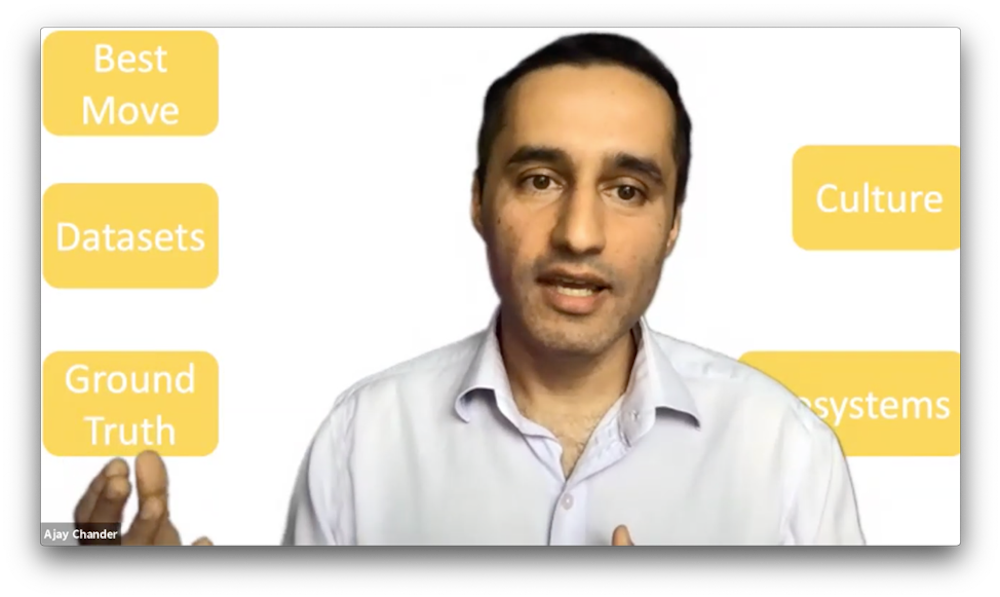
Chris Wright, the national lead for digital and mental health for the Scottish government, gave the first invited talk and spoke from his experience of designing and deploying digital care systems at population-scale. As the community looks forward to realizing personalized care with AI, having system architectures in place that connect various practitioner ecosystems will enable the technology to continually improve while providing impact and reach at scale.
Our research conversations – highlighted in green below – went beyond a description of the core research results and included the authors’ motivations for selecting the research problem and their view on important problems to solve in the future. This made for a rich dialogue with both the audience as well as between the authors. The research topics reflected in this part of the program spanned a variety of topics and techniques: from using Natural Language Processing (NLP) to detect depression and loneliness, to using the behavioral characteristics of some mental states as the inspiration to build better performing machine learning systems. We also highlighted new goals for security in AI-augmented mental health systems.
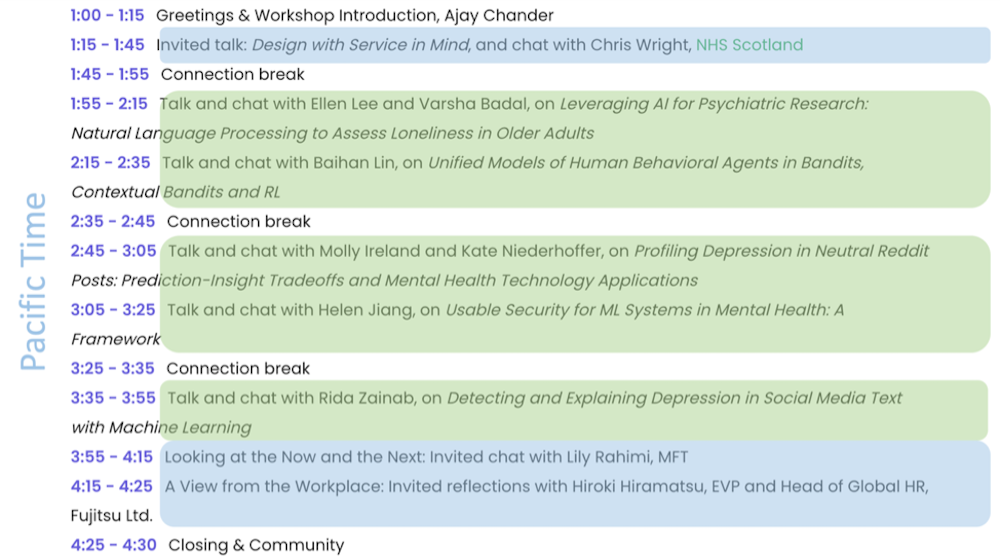
Hiroki Hiramatsu, EVP and global head of HR for Fujitsu, offered his reflections and hopes for AI and enterprise wellbeing, to close out our program on a positive note. His comments included the need for the thoughtful and ethical design of AI in service of augmenting human capacities in an organization, as the nature of work continues to evolve. As most organizations embed some of the responsibility for employee care with management, augmenting individual and management capacities for care with AI might be a unique vector to impact enterprise wellbeing positively.

Reflections
It is clear that the lack of good mental health and wellbeing at scale is an expensive problem globally. Good mental health at scale is a solvable problem, and it is increasingly clear that computational techniques will be an essential part of the solution.
The research and design of AI technologies for good mental health requires us to be mindful and inclusive of the diversity of experiences and contexts in which we face mental health challenges, and how we might represent that in data. The path to solving good mental health is paved with partnerships between professionals in various care ecosystems, AI researchers, government and policy experts, individuals, and institutions. One fundamental contribution of this workshop has been to inspire this growing community with good problems and promising pathways that AI offers to address them.
As solving for sustainability becomes more important for our planet, and becomes a central part of Fujitsu’s mission, we are called on to serve our communities as leaders on various fronts. We were delighted that Fujitsu’s leadership of this workshop pioneered new avenues for innovation to impact positively this fundamental pillar of sustainability: good mental health and wellbeing.
For more information, please contact our research team at good-kdd@us.fujitsu.com
Innovation Times - Autumn 2020
Other Article
 Building “Trust” in Society through Innovative Technologies
Building “Trust” in Society through Innovative Technologies Enhancing Facial Expression Research – Fujitsu Laboratories uses Online User Group Studies
Enhancing Facial Expression Research – Fujitsu Laboratories uses Online User Group Studies Gaining Momentum to Deliver Trusted AI – Fujitsu Laboratories’ Global Initiative
Gaining Momentum to Deliver Trusted AI – Fujitsu Laboratories’ Global Initiative Talking about AI Ethics at Fujitsu ActivateNow
Talking about AI Ethics at Fujitsu ActivateNow Focusing on Digital Trust at the 2020 Fujitsu Laboratories Advanced Technology Symposium(FLATS)
Focusing on Digital Trust at the 2020 Fujitsu Laboratories Advanced Technology Symposium(FLATS)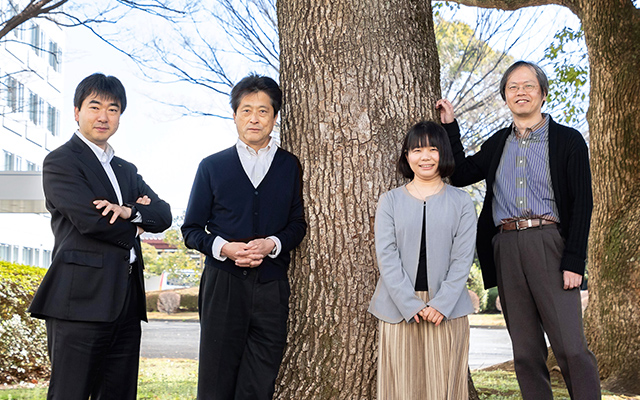 Meet the Team Solving Real-World
Meet the Team Solving Real-World
Problems with Digital Annealer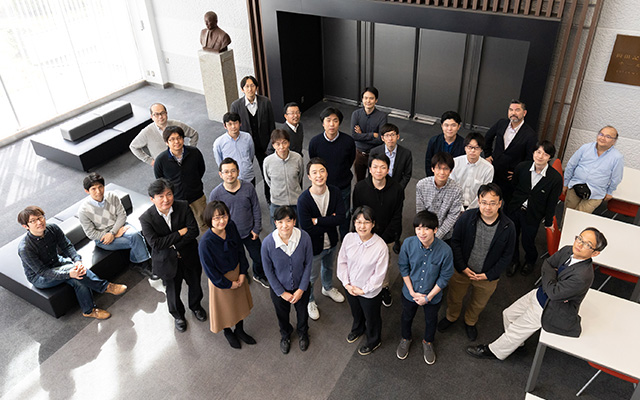 The Team behind "Actlyzer" -
The Team behind "Actlyzer" -
Transforming AI Behavior Analysis Accessibility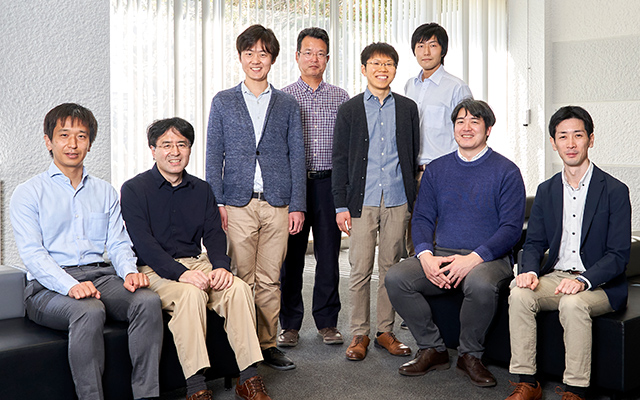 Developing Innovative Software for the DX Era -
Developing Innovative Software for the DX Era -
Insight into the Research Mindset



